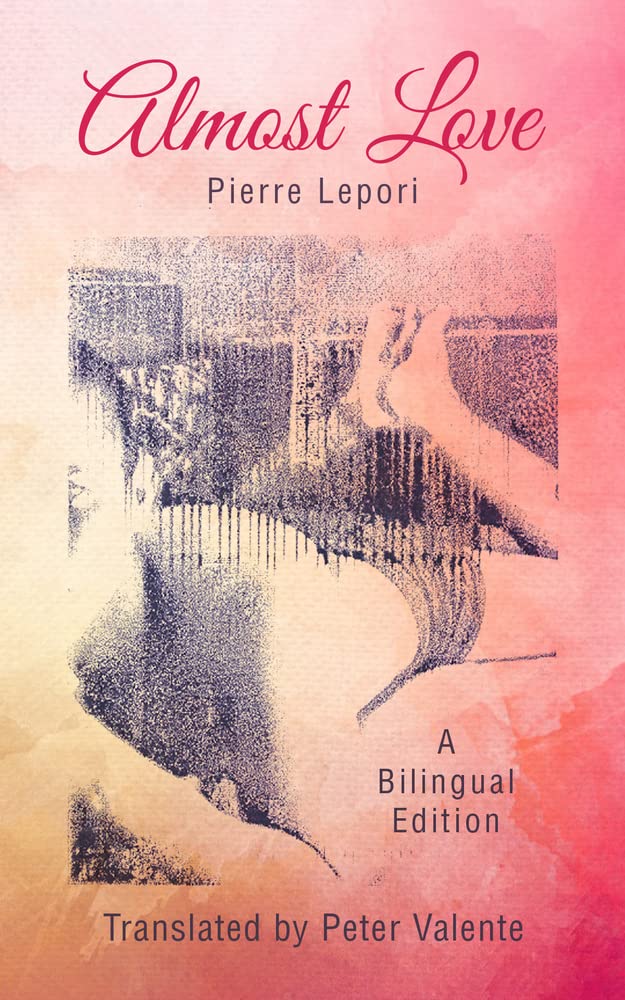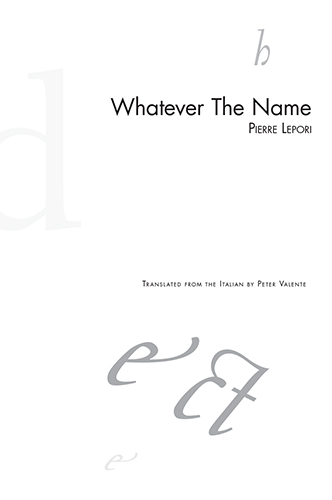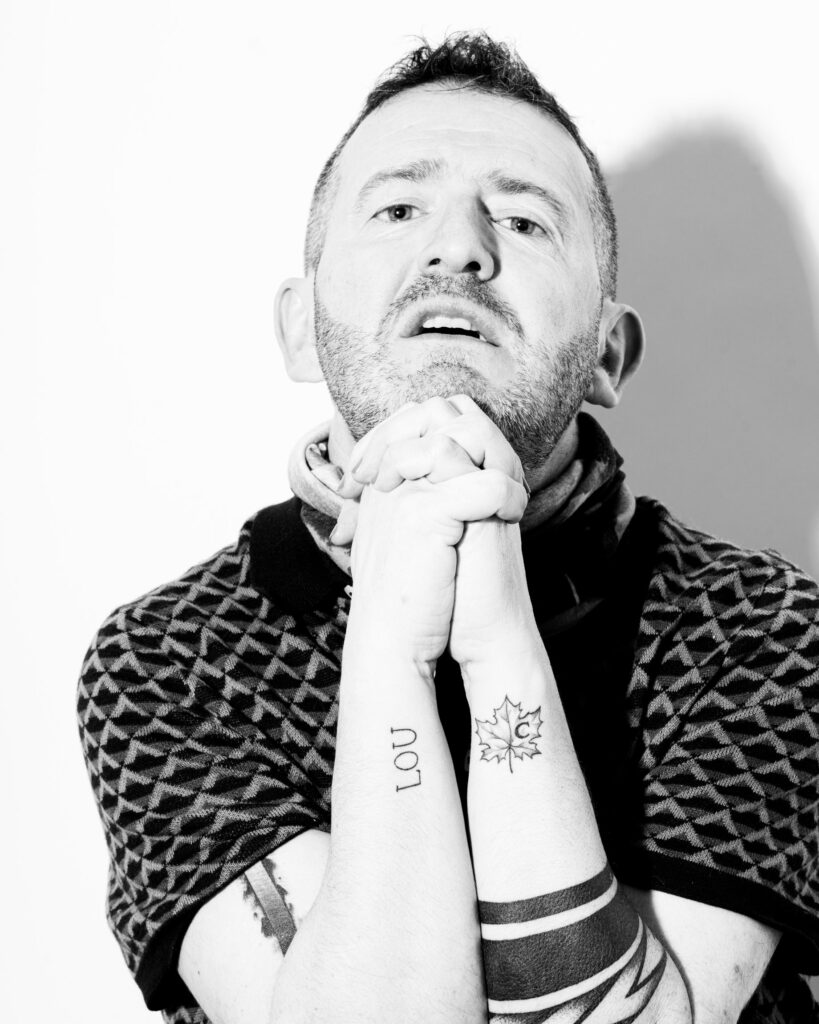My love where are you going?
you who always leave when I turn my back
you who leave and disappear
but your breath on my neck
is not a dream
this is the disciplined life
the ardor
the little of me that remains
when I look at you I do not see you
when you look at me you do not see me
my love that has a simple name
in the rise and fall of the hours
Quasi amore / Almost Love, English by Peter Valente (Guernica Press, Toronto)

Pierre Lepori’s Almost Love (Quasi Amore) contains forty-five short stanzas, reminiscent of a lyric tradition extending from the Greek elegiac poets, such as Sappho and Mimnermus, to the Italian poet, Sandro Penna. The poems revolve around the word “love” as compared to the precariousness of life and the incompleteness of language, thus generating new images in a poetry that is corporeal, homoerotic, reified and at the same time ethereal.
“There are forms of love – both physical and spiritual – that escape the events of what we call reality by convention.”
Review (Blurbs)
Almost Love bristles with imagery that is both startling and timeless, drawing us onto a love-road that branches towards eternity. In this epic work, Swiss poet Pierre Lepori effortlessly pulls the reader into a Jacob’s ladder of passion and despair. Separately, each stanza is a small jewel–linked together, they are truly dazzling. Beautifully translated by the poet Peter Valente, Almost Love is a work that shines brightly in these dark times.–Maggie Dubris
In these highly metaphoric and charged love poems the beloved becomes not just the characteristic object of desire, but the embodiment of desire itself. « There are doors open everywhere, » writes Lepori. Peter Valente has found each door the poet has opened and marvelously manages to convey for English readers the resonance, depth, beauty and language of Lepori’s originals.–Christopher Sawyer-Laucanno
In this bracing sequence of quasi-amorous poems, Pierre Lepori subjects both his emotions and the language in which he expresses them to clinical self-scrutiny. He is especially skilled at reading the precise calibrations of proximity and distance involved in loving and in speaking of love. Each entangled in tight knots of feeling, two lovers confront and turn away from each other, as the development of their relationship demands. In Peter Valente’s incisive translations, the language of love is spare and clear, as transparent as a finely-ground lens.–Gregory Woods
In Pierri Lepori’s Almost Love, the language is so disciplined, thus ravishing, the reader is able to transcend grief as undertone and focus instead on « the threshold of life » where tentativeness can be a small light towards an opening. Certainty can be a « stupid column » and this poetry surfaces from the ecstasy of a language attuned to how the lover’s image is what is reflected on « a beam of light / the breath kept / in the hollow of the hand » as it writes.–Eileen R. Tabios
It’s almost impossible to translate a poem. A translation is like a reflection of a lover in a mirror you cannot kiss although you see his lips. What’s remarkable about Peter Valente’s translation of Almost Love is that there is a kiss; there is nothing almost about it. Pierre Lepori’s Italian is beautiful, but so is Peter Valente’s English. I’ve read Almost Love several times now and love the poems because they’re real, the experience, not its reminiscence; when they tell you they love you, you hear them loud and clear. I can’t imagine anyone not sensually enjoying them.–Don Yorty
Peter Valente is a translator for whom every poet should hope. A distinguished poet, Valente possesses an exceptionally fine sense of the English language. Fluent in Italian and French as well, he renders the celebrated multilingual Swiss poet Pierre Lepori in nuanced English. Valente’s is an achievement of a remarkably high order, a great translation of a major book.–Edward Foster
The absence of a lover’s response in Pierre Lepori’s Almost Love is as powerful as the absence of light. The poet is consumed with his love and the lover–my love has lands bathed in rain / and white suns in the fold of the knee. » His love is tangible, intangible, sexual, mythic, and like the wind. When the poet begins to separate from his love, first a period of analysis, then as the veil lifts, barrenness and bitterness. As with Orpheus, if one tries too hard, love evaporates. The « we » flounders without a verb, but then Lepori moves from the wild longing that obscures sight and vision into a quiet acceptance of the shortness of love, of life. With the end of the love affair, whether imaginary or real, the love and the lover remain beautifully inscribed in Lepori’s poems.–Barbara Henning
Through a consanguinity of sculptural space and tormented silences, Peter Valente’s exquisite Almost Love erupts as a mereology, a mirrorology of aching hunger in the ferocity of desire. Riddled with arced echoes, madness and rigor; suspension, fragilities, agilities; pulsing partitas of lettered skin threshold in an erotics of meaning and being caressing and elevating the other and the other in language. With magnificent intensity, between dawns, bodies, fingers hauntings, lairs; between the « as if » and the « always already, » Almost Love will leave you forever absorbed in the textatically shadowed constructions of trembling eros.–Adeena Karasick
With its passionate echoes of Sappho and Cavafy, and the querulous shadow of Barthes, Lepori’s Almost Love continues the ageless attempt to fix the beloved in an ever-shifting sky. Anguish and ardor fuse in an idiom of invocation and idolatry, with an intimation of torn papyrus, or rolled parchment in a marble box. Yet Peter Valente’s sleek translation reveals the freshness of these timeless tropes, their inescapable resonance with our own personal mysteries. The leanness and immediacy of the language turns sentimentality into wonder, and the pure contrary intellect of Eros burns free.–Aaron Shurin
Never Endig Rhizome (English by Peter Valente)
black, the city has white windows
white, the city has black windows
black, the city has white windows
white, the city has black windows


Whatever The Name, translated from the Italian by Peter Valente, New-York City, Spuyten Duyvil, 2017
« You remember then: there was no garden, and you / endured the punishment of being alive, / closed off and lost while waiting / for the father a face, / between receiving beatings with a stick, like with the stones, / in some filthy corner of the backyard. Your father’s not coming, / and America is far away, there are poisonous spiders / and scorpions. All the houses have gardens / and in those gardens, children ».
Peter Valente is not only a gifted translator but also a fine poet. Both of these formidable strengths are in evidence in his marvelous rendition of Pierre Lepori’s Qualunque sia il nome. Due to Valente’s efforts, Lepori’s work, which interweaves societal concerns with personal history and a distinct regard for the interiorities of the Italian language, is now destined to reach a larger audience in the English speaking world. Valente’s faithful translations convey with grace and beauty not just the meanings but the stylistic subtlety of Lepori’s verse. Valente’s significant accomplishment can perhaps be best summed up by a phrase from Lepori himself: “…everything is now offered to us / like an array of sparkling lights.”
Christopher Sawyer-Laucanno

What I admire about this book is the fact that the painful and traumatic issues discussed are presented without the usual drama (‘There are wounds with no name’), in a way that almost suggests, without justifying them, of course, that they are a regular part of the fabric of life. There is something archetypal about these poems, something grounding, perhaps even something that can help deal with such issues. Which doesn’t mean that the suffering behind those incidents is any less apparent, or that the tragedy is less sizeable. It’s just that it is painted with a more subdued, almost pastel-like technique instead of screaming expressionist colours. It’s almost as if Lepori focuses on the stretches of silence between words being said and things being done, directing our attention to the negative, the reverse of events, as if he believes in silence: ‘Silence is your heart of wind and your childhood home’. And somehow he allows the private pain to distil over time into non-personal history, into pure archetypes. Anna Blasiak (Eurolitnetwork).
Again without rest
until the blank page is filled: each new beginning
counted on the palm of the hand,
is a new vigil, with one eye open,
a cry without echo.
It is not true that you have finished looking.
There is something that slowly destroys the comfort zone
of your recognizable fears. But to able to exist is already
one step you haven’t taken. Slowly,
very slowly, the evil is suffered and paid for.
Even fewer are those that recognize the One that exists.
And in this deafness the body has chosen,
you set out to prove
that you are not mute! Indeed, a flourish
of gestures. A flower
in a heap of stones, dormant and frail
in the cold sunlight.
Qualunque sia il nome/Quelque soit le nom. « (…) This intense and compact collection of poetry divided into two sections tells the story of a revolt against silence in the face of traumatic family secrets. The collection starts in the form of a dream-like dialogue with past generations, followed by a section concerning a physical experience from Leopri’s early childhood and culminates, in the second section, with a supplication for change in our morally and ethically restrictive society. His poems allow the reader to face his or her existential fears as well as the pain of child/parent relationships with all their differing realities and myths. Jean-Paul Werner Walshaw-Sauter, Goodreads.
For a Creolized Switzerland
(« Passagen« , nr. 61, 2-2013)
Every writer should be a “bastard,” says the great Franco-Algerian poet Jean Sénac. Or at least a “piccaninny” who does not “master” his own language, like the writer Patrick Chamoiseau of Martinique. Switzerland is not Creole – its mix of languages is territorial, existing side-by- side and separately – but the country offers us the possibility of infringement, of an act of betrayal of the mother tongue and the fatherland. To be in exile in one’s own country, to take a position at the margin of oneself, delocalizing the identifying fiction that covers and protects us, in short: to be at the edge of language “neither in it nor outside of it, on the unlocatable line of its slope” (Jacques Derrida). Even in a tamed and regimented Confederation, writing has, perhaps, this – residual – power of braving boundaries, of crushing legacies with the madness of a Louis Wolfson, that “student of schizophrenic languages,” who, in 1970, wrote a novel fleeing his mother’s language to confront it with “whole words ideally irreducible, at once liquid and continuous” (Gilles Deleuze).
We have the good fortune to live in a little patch of Europe where translation is a necessary practice, a communitarian respiration, but we must not mistake our situation: “Opposed to the idea of an equalizing translation – proceeding by carry-overs, by lateral equivalence – stands the joy of a respiratorial translation, idiotic and descending into the idiotic body, into the incomprehensible matter of each language (…). It is the experience of a voyage into the great well of memory and oblivion” (Valère Novarina).
In my experience – and perhaps in yours as well – there are several linguistic strata: echoes of the Marche and the Veneto, where my maternal grandparents came from; the dialect of the Ticino valleys on my father’s side, then the Italian of my school days and my studies in Florence; in Berne, later, there was German; and for the last fifteen years, the French of Lausanne. It was thus inevitable for me, once I became a writer, to ask myself the question of language: neither from here nor from else- where, not quite a migrant (with the attendant woes), I was able to exile myself more and more from the certainty of a monolithic language. Thus the need to translate myself, to betray myself by constantly betraying my origins (in the bastard sonorities of a Francophone with an Italian accent). And to stop trying to opt for one single language.
Is there a fundamental difference between writing in one’s mother tongue or in another? Between translating others and translating yourself? I don’t think so, unless you hold a moralizing idea of translation. The philosopher Arno Renken has devoted an important study to the concept of “amoral” translation: Happy Babel (Babel heureuse). His subtle argument: “The experience (of translation) is not a fixation to cling to, but rather a destabilization to be embraced. If so much of the discourse slaves away with all the trappings of necessity and morals to render the translation indistinguishable from the original, if so many try so hard to appropriate it with great strokes of “accuracy,” “fidelity” or “adequacy,” perhaps it is only to suppress the anxiety that translation inscribes in the literary and philosophical order.”
To transgress monolingualism is to affirm the perpetual motion of language, the freedom that stumbles at each step, at each word, that spills over to invent stammering worlds. A utopian idea? Yes, but… Let us not forget that fifty percent of the world’s population is already, de facto, bilingual or multilingual (as David Bellos reminds us). Let us creolize Switzerland, then, embracing our uncertainties and our transgressions, and the multiple languages that criss-cross and weave together the space we live in.
(Translated from the French by Bruce Lawder)
Literary Translingualism in Switzerland: Pierre Lepori and Beat Christen FLUSSER STUDIES 22 (Rainer Guldin)
The Swiss writer Conrad Ferdinand Meyer had two languages at his disposal, German and French. He hesitated, but in the end he opted to write in German. His decision was deeply affected by the outcome of the French-German war of 1870, which led to the unification of Germany. Contemporary Swiss writers do no longer have to grapple with such heartbreaking decisions. Quite the opposite is the case. In the last few decades, new forms of translingual writing have come into being. They have created a dense dialogical net across the country linking the four linguistic regions with each other. In this paper I would like to discuss two significant examples of this new form of translingual literature. Pierre Lepori combines Italian and French and Beat Christen writes in German and French.


